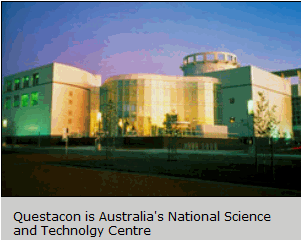|
|
|
|
|
|
|
News & Views item - September 2009 |
![]() The Onus Falls as Much on the Science Sector as Industry to Develop Convincing
New Faces of Science. (September 7, 2009)
The Onus Falls as Much on the Science Sector as Industry to Develop Convincing
New Faces of Science. (September 7, 2009)
 The
following opinion piece by Professor John Rice, Executive Director of the
Australian Council of Deans of Science (ACDS) and Bradley Smith, Executive
Director, Federation of Australian Scientific and Technological Sciences (FASTS)
was first published in today's Australian Financial Review and is
reprinted here with permission.
The
following opinion piece by Professor John Rice, Executive Director of the
Australian Council of Deans of Science (ACDS) and Bradley Smith, Executive
Director, Federation of Australian Scientific and Technological Sciences (FASTS)
was first published in today's Australian Financial Review and is
reprinted here with permission.
___________________________________
Onus Falls On Industry To Put A New Face On Science*
By John Rice And Bradley Smith
Australian Financial Review, Monday 7 September 2009
A critical challenge for industry, universities and science organisations is to
develop convincing profiles of scientific work in the 21st century,
not least of all as the basis for attracting young people to science.
There is a significant disconnect between the image of a research scientist and
the working life of the majority of scientifically and technologically trained
graduates. In part, this has come about because of a lack of attention to how
the ‘business models’ of professional scientists and technologist have been
utterly transformed in the past few decades.
Education authorities, Government and science organisations promote the study of
science on the basis that science and technology drives the global economy, and
a scientifically skilled workforce is necessary for competitive advantage in
both generating and adopting new technology.
From here there is a tacit leap to the idea that there are lots of ‘science’
jobs out there.
However, ‘science’ jobs have changed dramatically. Computer systems and new
sophisticated instruments do much of the routine technical work that trained
technicians used to do, resulting in both astonishing increases in the
productivity of techno-science and changes in divisions of labour.
It is worth exploring the question of what role technically trained people now
play in a developed economy. How have the required skill sets and roles changed
over time? Do developed economies need fewer science trained people but in
higher level and more specialised areas? How do employers now identify and
describe the kind of science background that they require of their recruits, and
the roles that they have in mind for them?
Anecdotally, there seems to be increasing number of firms concerned that science
graduates do not have adequate technical skills upon graduation from
universities and the gap is growing.
This does not surprise academics. The erosion of funding per student in real
terms over the past twenty-five years has reduced the capacity of universities
to provide adequate and comprehensive technical, laboratory, field work and
other skills in undergraduate science programs.
However, it seems to us that the issues are more complex and interesting than
simply that of skills shortages. At the heart of the matter seems to be a poorly
articulated sense of how the nature of the technical workforce has changed over
the last thirty years in the face of the globalisation, generalisation of ICT
and technological change. In addition, there is a lack of clarity as to how
employers identify and describe the kind of science background that they require
of their recruits, and the roles that they have in mind for them.
Management has changed significantly but it is not clear that we have a good
handle on how working life for scientifically trained personnel has changed.
If you think about how the role of the shop assistant or tradesperson has
changed in the face of computers and mobile phones, then the role of the
scientist in the workforce has probably changed as much. Or to pose the issue in
different language – how has the ‘business model(s)’ of being a non-academic
scientist or scientifically trained person changed in the past few decades?
One problem is how much we take scientific research as the only idea of real
science and any other kind of scientific worker such as teachers or industrial
workers often consider themselves relegated to the 2nd division.
More than 90% of science graduates do not become researchers, yet we know very
little about where they go and how their training relates to career pathways.
Science faculties are aware of the lack of an adequate construction of science
as a profession. There is an increasing number of postgraduate coursework
programs specifically building high level non-research professional skills in,
for example, IP management and data storage and management.
Engineering, law, accounting, architecture and clinical psychology have
certifying powers under law for the activities they are responsible for. This
economic power underpins their construction as professions. Perhaps it is
unlikely that industry science will gain similar statutory recognition.
Nevertheless there does seem to be an imperative for convincing professional
profiles of science at work. Industry groups have a key role in helping to
articulate these roles. This needs to go beyond focusing on cocktails of skills
and open up a more sophisticated and generative way to think about attributes of
scientifically trained people in the workplace.
______________________________________
*As is common practice, the title of an opinion
piece is determined by the newspapers’ editors; not the authors. We would say
the onus falls at least as much on the science sector as industry in developing
convincing new faces of science.